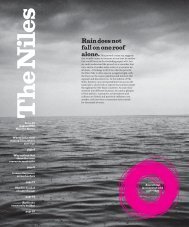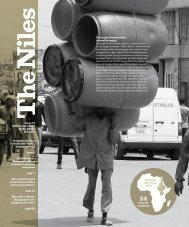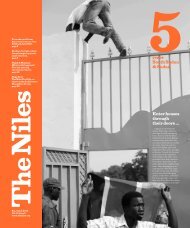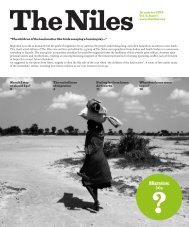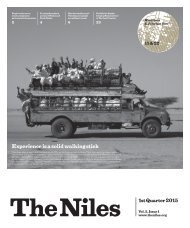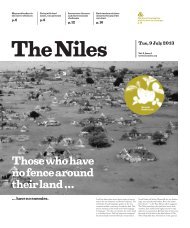When deeds speak, words are nothing
Speaking about sustainable development is easy. Acting sustainably is another matter. And now the evidence is unequivocal: Mankind’s impact on nature is causing the climate to change rapidly and drastically, threatening the environment and the very resources we need to survive. Aware that humanity is careening close to the edge, The Niles correspondents set out to explore where and how people in the Nile Basin region rethink. So much of their findings for now: We are an endlessly innovative species. Cooperation is our superpower. When deeds speak, words are nothing.
Speaking about sustainable development is easy. Acting sustainably is another matter. And now the evidence is unequivocal: Mankind’s impact on nature is causing the climate to change rapidly and drastically, threatening the environment and the very resources we need to survive. Aware that humanity is careening close to the edge, The Niles correspondents set out to explore where and how people in the Nile Basin region rethink. So much of their findings for now: We are an endlessly innovative species. Cooperation is our superpower. When deeds speak, words are nothing.
You also want an ePaper? Increase the reach of your titles
YUMPU automatically turns print PDFs into web optimized ePapers that Google loves.
re<think
the way
we eat
Top right:
A cattle farmer in Kenya.
Photo: The Niles / Pius Sawa
Above:
Goats on a slaughterhouse
compound in Kenya.
Photo: The Niles / Pius Sawa
38
“Emissions
reduction must
align with actions
that accelerate
the realisation
of socio-economic
priorities.”
In comparison, plant-based foods have
much smaller carbon footprints. On average,
emissions from plant-based foods are 10-50
times smaller than those from animal products.
Ethiopia has the largest livestock population
of any other country in Africa, making
it an East African powerhouse in leather and
meat factories.
However, internationally, Africa is far from
a significant culprit in emissions of climate
gases. Dr. David Munang, the United Nations
Environment Programme (UNEP) Regional
Climate Coordinator, says Africa is responsible
for only 2-3 percent of global emissions. Of this
amount, up to 56 percent are land-based, driven
by land degradation and the destruction of
ecosystems. Agriculture is often to blame for
destroying ecosystems to gain more farmlands.
“If you were to go down to country levels,
you will realise that most countries in Africa
emit less than 1 percent, in fact, a fraction of
1 percent (of global emissions). Logically speaking,
it follows that Africa does not have any
significant emissions to cut,” says Munang.
However, while climate change is global,
he says, the poor are disproportionately vulnerable
to its effects because they cannot afford
the goods and services they need to buffer
themselves against the worst of the changing
climate impacts.
He says the continent loses up to USD
48 billion worth of food each year on its food
systems due to reduced harvests.
“Considering that the continent has committed
to emission cuts in its Nationally
Determined Contributions (NDCs), including
in land-based actions like agriculture which
are the leading sources of emissions through
degradation, the key, therefore, is that these
emissions reduction must align with actions
that accelerate the realisation of socio-economic
priorities – food security, creation of income
and enterprise opportunities, expansion of
macroeconomic growth.”
Munang further says it is time to seek lasting
solutions, like solar dryers, which dehydrate
rice up to 48 times faster than regular drying.
“This is minimising losses while maintaining
quality to increase earnings of farmers.”
Solar dryers, on average, enable farmers
to achieve up to 30 times income increases. They
have been proven to lower emissions by over
200,000 tonnes relative to an alternative fossilfuel-driven
value addition solution.
Still another example is waste recovery.
Rice husks, a byproduct of rice, can be addedvalue.
Converted to fuel briquettes, the husks
offer an alternative to charcoal use which drives
deforestation and degradation, which, in turn,
triggers emissions.
“Rice husks can also be converted to biofertiliser,
lowering emissions resulting from
the chemical fertiliser supply chain.”
Munang describes the approach as “mitigation
powering adaptation” – where efforts
to lower emissions in agriculture are tied to
value-addition to unlock essential income and
socio-economic opportunities. “This is how
we ought to approach agriculture emissions
in Africa, a negligible emitter.”









